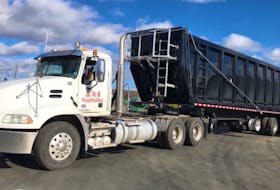Households across Prince Edward Island have been doing their part to safely recycle their used batteries, and the Call2Recycle team is grateful for everyone’s efforts.
When they’re recycled safely, materials from those used batteries can be reclaimed to create many of the new presents Islanders will be opening up over the holidays: everything from stainless steel water bottles, watches and pens to golf clubs, small appliances and bicycles.
Joe Zenobio, President of Call2Recycle Canada, Inc., says he’s so encouraged by everyone’s good battery-recycling habits and hopes they’ll continue to “give a gift to the planet” this holiday season.
“When you drop off your batteries for recycling, not only are you allowing old products to be recycled to create new ones, you’re helping protect and preserve the planet by keeping potentially toxic material out of landfill — safeguarding the environment for future generations,” says Zenobio.

Due to their chemistries and metals, batteries require a specialized recycling process and should not be dropped in regular household recycling bins as residential recycling facilities are not designed to separate batteries from other household recyclables. To keep these batteries out of local landfills, it’s important that consumers take the time to protect and store their old batteries at home until they’re ready to drop them off for recycling at any of the participating retailers, grocery stores or Waste Watch Drop-off Centres.
When used batteries are thrown away with household waste, they’ll end up in a landfill where they may be harmful to wildlife and the environment. Even just tossing them into a bin is a potential fire risk, as used batteries may still retain a residual charge and can spark if they brush against metal objects — or other batteries.
Used batteries should be safely stored in individually sealed plastic bags (a lithium battery’s positive terminals should be covered with duct tape, electrical tape or clear packing tape) and stored in a non-metal bin until you’re ready to bring them in for recycling at your nearest Call2Recycle drop-off location.
Call2Recycle is the Island’s provincially approved, not-for-profit household battery collection and recycling program. It’s urging Islanders to protect, store and recycle their used batteries safely. Zenobio says the program has been extremely successful so far on P.E.I. and he’s looking forward to seeing how many used batteries can be safely collected and recycled in 2021.
“We thank our partners at the Island Waste Management Corporation and their Waste Watch Drop-Off Centres, along with all our other battery collection partners including The Home Depot, Staples, Canadian Tire, Lowes and RONA, Atlantic Superstore, Sobeys, Foodland, your Independent Grocer and Co-op stores,” says Zenobio. “The best way to ensure that batteries aren’t filling our landfills is to make sure they never get there.”
To learn more about the importance of protecting, storing and recycling your batteries this holiday season — or to find a drop-off location close to you — please visit call2recycle.ca/protect-store-recycle.
QUICK TIPS FOR THE HOLIDAYS
Stay organized during the chaos of present-opening by stocking a little bin or basket with some essentials to make the process easier ...
- Packages of new batteries (various sizes and types)
- A few small screwdrivers (for opening battery compartments)
- A permanent marker for initialing identical gifts and stocking stuffers once they’re opened (#lifewithkids)
- Recycling bags for corralling cardboard and recyclable wrapping paper
- Trash bags for bows, ribbons and wrapping paper that isn’t recyclable (shiny, metallic, etc.)
- Non-conductive tape (clear packing tape, duct tape or black electrical tape) to cover the positive (+) terminals of any old lithium batteries
- Small, sealable bags for collecting used batteries individually
- A small non-metal container for storing the used batteries until they can be brought to your nearest Call2Recycle drop-off location
How to safely recycle your old batteries
- PROTECT THEM.
Used batteries should be placed in clear sealable plastic bags (multiple cylindrical alkaline batteries may be wrapped together) or have their ends taped with small pieces of clear packing tape, duct tape or electrical tape.
- STORE THEM.
So what do you do with your used batteries after that? Place them in a non-metal container — like an old yogurt tub or a plastic storage bin. Keep the container in a cool, dry place that’s away from direct sunlight or extreme heat.
- RECYCLE THEM.
Once you have a small stash of protected, safely stored batteries, bring them to a Call2Recycle drop-off location so they can be recycled. Be sure to contact them first to confirm they are accepting used batteries and check their hours of operation, which may be limited due to COVID-19.
Many hardware stores are approved drop-off points with flame-retardant boxes for accepting used batteries. To find a drop-off location close to you, visit Call2Recycle.ca/locator and it will display a list of options.









